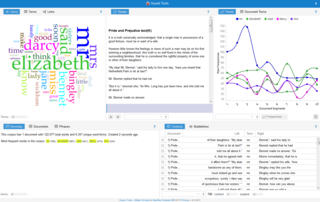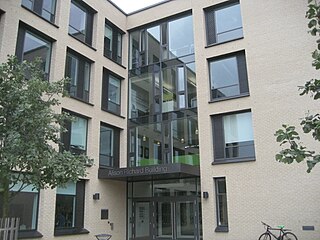Related Research Articles
The Women Writers Project, or WWP, is a long-term research and digital publication project within the field of feminist digital humanities that makes texts from early modern women writers in the English language available online through electronic text encoding. Since 1999, WWP has maintained Women Writers Online, an electronic collection of rare or difficult to obtain works written or co-authored by women from the early modern period. It is currently housed within the Northeastern University Library’s Digital Scholarship Group.

Environmental history is the study of human interaction with the natural world over time, emphasising the active role nature plays in influencing human affairs and vice versa.

The environmental humanities is an interdisciplinary area of research, drawing on the many environmental sub-disciplines that have emerged in the humanities over the past several decades, in particular environmental literature, environmental philosophy, environmental history, science and technology studies, environmental anthropology, and environmental communication. Environmental humanities employs humanistic questions about meaning, culture, values, ethics, and responsibilities to address pressing environmental problems. The environmental humanities aim to help bridge traditional divides between the sciences and the humanities, as well as between Western, Eastern, and Indigenous ways of relating to the natural world and the place of humans within it. The field also resists the traditional divide between "nature" and "culture," showing how many "environmental" issues have always been entangled in human questions of justice, labor, and politics. Environmental humanities is also a way of synthesizing methods from different fields to create new ways of thinking through environmental problems.
The term sense of place has been used in many different ways. It is a multidimensional, complex construct used to characterize the relationship between people and spatial settings. It is a characteristic that some geographic places have and some do not, while to others it is a feeling or perception held by people. It is often used in relation to those characteristics that make a place special or unique, as well as to those that foster a sense of authentic human attachment and belonging. Others, such as geographer Yi-Fu Tuan, have pointed to senses of place that are not "positive," such as fear. Some students and educators engage in "place-based education" in order to improve their "sense(s) of place," as well as to use various aspects of place as educational tools in general. The term is used in urban and rural studies in relation to place-making and place-attachment of communities to their environment or homeland. The term sense of place is used to describe how someone perceives and experiences a place or environment. Anthropologists Steven Feld and Keith Basso define sense of place as: 'the experiential and expressive ways places are known, imagined, yearned for, held, remembered, voiced, lived, contested and struggled over […]’. Many indigenous cultures are losing their sense of place because of climate change and "ancestral homeland, land rights and retention of sacred places".

Digital humanities (DH) is an area of scholarly activity at the intersection of computing or digital technologies and the disciplines of the humanities. It includes the systematic use of digital resources in the humanities, as well as the analysis of their application. DH can be defined as new ways of doing scholarship that involve collaborative, transdisciplinary, and computationally engaged research, teaching, and publishing. It brings digital tools and methods to the study of the humanities with the recognition that the printed word is no longer the main medium for knowledge production and distribution.
The Environmental Design Research Association (EDRA) is an international, interdisciplinary organization founded in 1968 by design professionals, social scientists, students, educators, and facility managers. The purpose of EDRA is the advancement and dissemination of environmental design research, thereby improving understanding of the interrelationships between people, their built and natural surroundings, and helping to create environments responsive to human needs. Along with IAPS, MERA, PaPER, and EBRA, EDRA is one of the major international associations that focuses on the field of Environmental Design Research.
The European History Network has run a number of projects under the banner of the Creating Links and Overviews for a New History Agenda (CLIOH) since 1988, including CLIOH, CLIOHnet and CLIOHnet2. Both CLIOHRES and CLIOH-WORLD are currently in operation as of December 2011. It was initially founded as the ECTS History Network, a pilot project of the ECTS.

Earth Rangers is a Canadian registered charity focused on environmental education and conservation for children and families. The goal of the organization is to educate children and their families about environmental issues, and mobilize them to take actions that protect animals and the environment. Earth Rangers is membership-based, with over 300,000 members and alumni across Canada. Earth Rangers also provides in-school programming to elementary schools, with school assemblies that feature live animal ambassadors. Earth Rangers headquarters is located in Woodbridge, Ontario.

The American Society for Environmental History (ASEH) is a professional society for the field of environmental history. The ASEH was founded in 1977 and its mission is to increase understanding of current environmental issues by analyzing their historical background. The ASEH promotes scholarship and teaching in environmental history, supports the professional needs of its members, and connects their work with larger communities. The organization's goals are to expand the understanding of the history of human interaction with the natural world, to foster dialogue with multiple disciplines and the public, and to support global environmental history that benefits the public and scholarly communities.

The Centre for Research in the Arts, Social Sciences and Humanities (CRASSH) is an interdisciplinary research centre within the University of Cambridge. Founded in 2001, CRASSH came into being as a way to create interdisciplinary dialogue across the University’s many faculties and departments in the arts, social sciences, and humanities, as well as to build bridges with scientific subjects. It has now grown into one of the largest humanities institutes in the world and is a major presence in academic life in the UK. It serves at once to draw together disciplinary perspectives in Cambridge and to disseminate new ideas to audiences across Europe and beyond.
Digital history is the use of digital media to further historical analysis, presentation, and research. It is a branch of the digital humanities and an extension of quantitative history, cliometrics, and computing. Digital history is commonly digital public history, concerned primarily with engaging online audiences with historical content, or, digital research methods, that further academic research. Digital history outputs include: digital archives, online presentations, data visualizations, interactive maps, timelines, audio files, and virtual worlds to make history more accessible to the user. Recent digital history projects focus on creativity, collaboration, and technical innovation, text mining, corpus linguistics, network analysis, 3D modeling, and big data analysis. By utilizing these resources, the user can rapidly develop new analyses that can link to, extend, and bring to life existing histories.
The Montreal Institute for Genocide and Human Rights Studies (MIGS) is a research institute based at Concordia University in Montreal, Quebec, Canada. It was founded in 1986 and promotes human rights awareness, in the field of genocide and mass atrocities by hosting frequent events, publishing policy briefs, engaging in counter activism on the web, and many other programs. Its keystone project is the Will to Intervene (W2I) Project which, under the advisement of Lt. General Roméo Dallaire and MIGS' Director Frank Chalk, builds domestic political will in Canada and the United States to prevent future mass atrocities.
The Medici Archive Project (MAP) is a research institute whose mission is to disseminate, publish, and teach archival studies, paleography and the cultural legacy of the Medici Grand Dukes. It is based in Florence, Italy and is directed by Alessio Assonitis.
Future Earth is an international research program which aims to build knowledge about the environmental and human aspects of Global change, and to find solutions for sustainable development. It aims to increase the impact of scientific research on sustainable development.
The Center for Energy and Environmental Research in the Human Sciences (CENHS) is an interdisciplinary research center at Rice University that focuses on applying the arts, humanities, and social sciences on energy and environmental challenges.
Social Networks and Archival Context (SNAC) is an online project for discovering, locating, and using distributed historical records in regard to individual people, families, and organizations.
Sara B. Pritchard is an American historian of technology and environmental historian. She has written books on environmental technology and history. Pritchard is an associate professor of science and technology studies at Cornell University College of Arts and Sciences.

Wet Prairie: People, Land, and Water in Agricultural Manitoba is a 2011 book by Canadian historian Shannon Stunden Bower. The book examines the history of settlement and farming in the unique landscape of southern Manitoba, notable for its poor drainage and thus high levels of moisture that contrast with the aridity of much of the Great Plains. Stunden Bower uses this unique context to focus on the development of liberalism on the Prairies, from the late nineteenth into the twentieth centuries, highlighting tensions between private property and state intervention and between agricultural development and wetland conservation. The book uses the term "colloquial liberalisms" to describe how variable landscapes shaped local interpretations of liberalism, highlighting the ways in which ideologies interact with the environment. In this case, drainage needs and policy created "differing understandings of the appropriate interplay of individual land rights with government tax or environmental policies." Wet Prairie ultimately demonstrates "that Canada’s political history cannot fully be understood without paying attention to the environment."

Carolyn Finney, is a storyteller, author, artist, educator, and currently a scholar-in-residence in the Franklin Environmental Center at Middlebury College. Finney's work reveals how nature and the environment are racialized in America. She began her professional journey as an actor; for eleven years she worked in television while honing her craft. After leaving acting, Finney spent five years backpacking through Africa, Asia and Europe, and living in Nepal. Inspired by this experience, Finney furthered her education and completed her Bachelors of Arts at Fairhaven College at Western Washington University in gender and international development. She completed her Masters of Social Science at Utah State University focusing on international rural community development. She went on to fulfill her Ph.D. in Geography at Clark University. Finney's full-time work is engaging with a wide variety of organizations, institutions and community groups in her capacity as a public speaker, consultant, advisor and writer.
References
- ↑ "NiCHE's "About" Page".
- ↑ Turkel, Bill. "Digital Infrastructure Page".
- ↑ Piper, Liza. "Early Canadian Environmental Data Project".
- ↑ "Networks".
- ↑ "New Scholars Network Page".
- ↑ "Place and Placelessness Website".